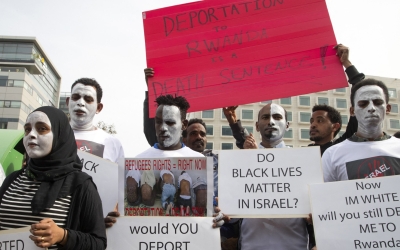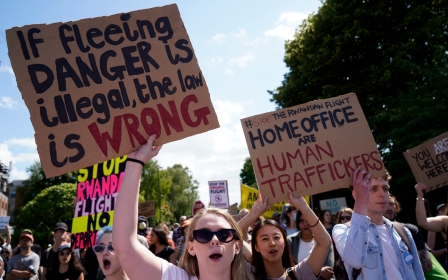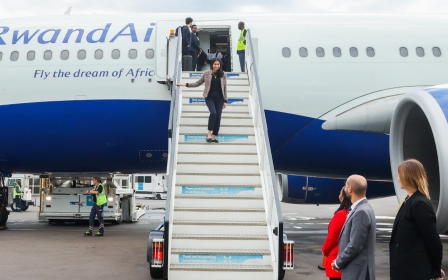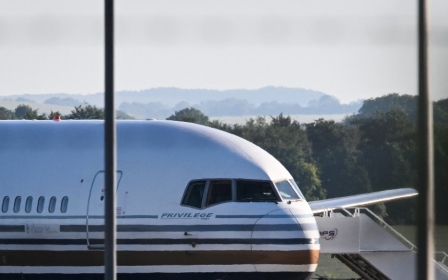UK: Supreme Court rules plan to send refugees to Rwanda unlawful
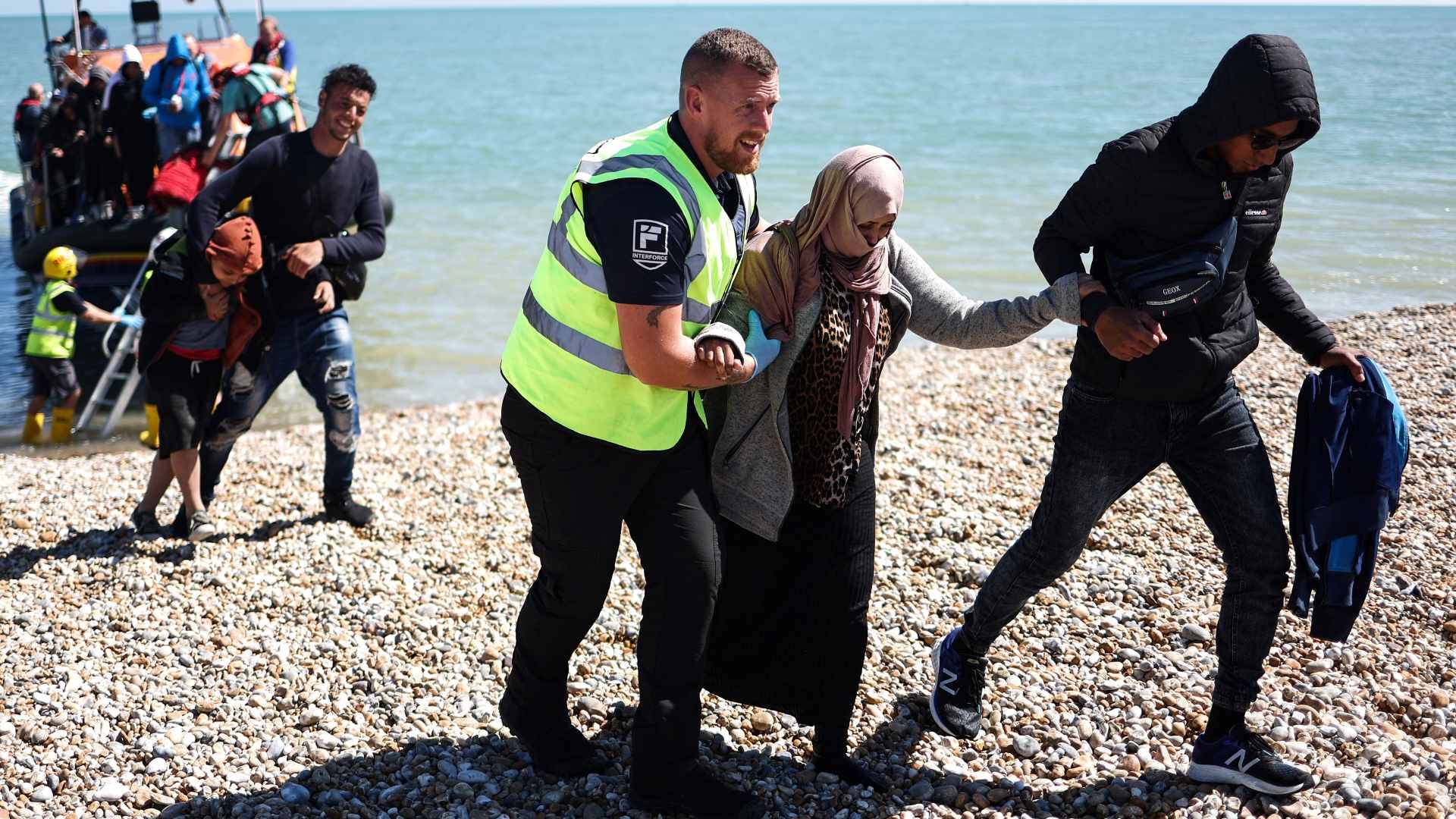
The UK government’s plan to send asylum seekers to Rwanda is unlawful and would put refugees at risk of being returned to countries from where they had fled, the Supreme Court has ruled.
In a unanimous judgment on Wednesday, the court upheld an earlier judgment by the Court of Appeal, which had also deemed the policy illegal.
“The Supreme Court unanimously dismisses the Home Secretary’s appeal, and upholds the Court of Appeal’s conclusion that the Rwanda policy is unlawful,” the court said in a summary of the case published alongside the judgment.
“This is because there are substantial grounds for believing that asylum seekers would face a real risk of ill-treatment by reason of refoulement to their country of origin if they were removed to Rwanda.”
The ruling by the UK's highest court followed legal action brought against the government by asylum seekers from Syria, Iran, Iraq, Sudan and Vietnam.
New MEE newsletter: Jerusalem Dispatch
Sign up to get the latest insights and analysis on Israel-Palestine, alongside Turkey Unpacked and other MEE newsletters
Speaking in the House of Commons, Prime Minister Rishi Sunak told MPs that the judgment confirmed that the principle of sending asylum seekers to a safe third country was lawful. He said the government was already working on a new treaty with Rwanda.
Sunak later told a news conference that hhis government would pass emergency legislation declaring Rwanda to be safe.
Commenting on the prospect that any new plan to send asylum seekers to Rwanda could be blocked by the European Court of Human Rights, he added: "I will not allow a foreign court to block these flights. If the Strasbourg court chooses to intervene against the express wishes of parliament I am prepared to do what necessary to get flights off."
Braverman's 'dream'
The Rwanda scheme is a flagship immigration policy associated with former Home Secretary Suella Braverman, who was sacked by Sunak on Monday.
In October 2022, Braverman said it was her "dream" and "obsession" to see a photo of a plane carrying asylum seekers to Rwanda on newspaper front pages.
She pledged to deliver the scheme as a deterrent, following a surge in the number of people arriving in the UK irregularly by crossing the English Channel from France in small boats. But no flights have ever departed.
According to figures published by the Home Office, more than 52,000 people arrived in the UK via irregular routes, mostly aboard small boats, in the year to June 2023.
The most common nationalities among those reaching the UK between July 2021 and June 2023 included Iranians, Afghans, Iraqis and Syrians.
In a letter to Sunak published on Monday night, before the Supreme Court judgment was issued, Braverman accused him of failing to draft new laws which would have prevented legal challenges to the policy.
In its judgment, the Supreme Court upheld the Court of Appeal’s ruling overturning a lower court which had initially ruled that the government was entitled to accept the Rwandan government's assurances that asylum seekers would not be sent back to their own countries.
It said the government should have taken into account deficiencies with Rwanda’s asylum system identified by the United Nations’ refugee agency (UNHCR), and Rwanda’s poor human rights record.
It said Rwanda had also failed to comply with an undertaking not to return asylum seekers to their own countries which it had agreed to as part of a similar scheme with Israel between 2013 and 2018.
It cited data provided by UNHCR which showed that Rwanda had rejected all asylum appeals from Syria, Yemen and Afghanistan between 2020 and 2022 - a rate of rejection it described as "surprisingly high".
“The evidence shows that there are substantial grounds for believing that there is a real risk that asylum claims will not be determined properly, and that asylum seekers will therefore be at risk of being returned directly or indirectly to their country of origin,” the Supreme Court said.
Wednesday's judgment was welcomed by charities and campaign groups supporting refugees and irregular migrants.
In a joint statement, coordinated by the Joint Council for the Welfare of Immigrants and signed by 129 civil society organisations, they said: "The Rwanda plan was always cruel and immoral. We urge the government to immediately abandon such plans with Rwanda or with any other country, and instead protect the rights of people who have come to our country in search of sanctuary."
In a statement to the House of Commons, Home Secretary James Cleverly, who replaced Braverman on Monday, said the government had anticipated the judgment and had already been "working on a plan to provide the certainty that the court demands".
"We have a plan to deliver the Rwanda deal and we will do whatever it takes to stop the boats," he said.
The Rwandan government said: "This is ultimately a decision for the UK’s judicial system. However, we do take issue with the ruling that Rwanda is not a safe third country for asylum seekers and refugees, in terms of refoulement.
"Rwanda is committed to its international obligations, and we have been recognised by the UNHCR and other international institutions for our exemplary treatment of refugees."
The UNHCR said in a statement it welcomed the judgment that the transfer of asylum seekers would breach international and UK law.
"UNHCR has consistently conveyed our deep concern about the 'externalization' of asylum obligations and the serious risks it poses for refugees," it said.
Middle East Eye delivers independent and unrivalled coverage and analysis of the Middle East, North Africa and beyond. To learn more about republishing this content and the associated fees, please fill out this form. More about MEE can be found here.


